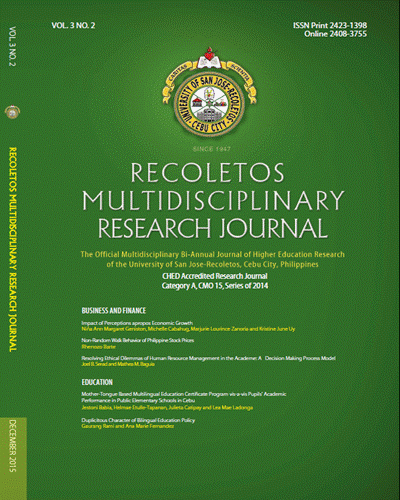Moral Culture in Kant’s On Education (1803): Implications and Antitheses
DOI:
https://doi.org/10.32871/rmrj1503.02.13Keywords:
philosophy, Immanuel Kant, On Education, moral culture, qualitative researchAbstract
The Philippines has been inundated with socio-politico issues that impede people’s desire for the country’s uninterrupted progress. These issues may be complex but their antidote is contrarily simple. An answer is found in Immanuel Kant’s thought on moral culture which pertains to three essential features, namely: obedience, truthfulness, and sociableness. This qualitative research focuses on the fundamental ideas in the section on moral culture in Kant’s On Education. As my contribution to the fund of knowledge, I proceed by establishing the implications and antitheses of the three features of Kant’s moral culture. A discussion on obedience differentiates its two kinds: absolute and voluntary. Absolute obedience is the result of compulsion by a command, while voluntary obedience is the result of confidence by a reasonable will. It is impossible to think of character formation without also thinking of truthfulness. Kant asserts that a man who tells lies has no character. Sociableness emphasizes on the importance of building relationships and friendships. The researcher contends that these three features of moral culture have corresponding antitheses: violation of laws of the land for obedience; lying and dishonesty (highest form is corruption in politics) for truthfulness; and human rights violation (highest form is war) for sociableness. Finally, these features are imperative in forging peace and social order which usher to a kind of development that people aspire.
References
Blackburn, Keith & Forgues-Puccio, Gonzalo F. (2010). Financial liberation, bureaucratic corruption and economic development. Journal of International Money and Finance, Vol. 29, 1321-1339. doi:10.1016/j.jimonfin.2010.05.002. Retrieved from http://www.sciencedirect.com/science/article/pii/S0261560610000598.
Charlton, Bruce G. (2009). Are you an honest scientist? Truthfulness in science should be an iron law, not a vague aspiration. Medical Hypotheses, Vol. 73, 633-635. doi:10.1016/j.mehy.2009.05.009. Retrieved from http://www.sciencedirect.com/science/article/pii/S0306987709003429.
Cohen, Alix A. (2008). Kant’s answer to the question ‘what is man?’ and its implications for anthropology. Studies in History and Philosophy of Science, Vol. 39, 506-514. doi:10.1016/j.shpsa.2008.09.008. Retrieved from http://www.sciencedirect.com/science/article/pii/S0039368108000848.
Coronel, Sheila S. (1998). Pork and other Perks: Corruption and Governance in the Philippines. Quezon City: Philippine Center for Investigative Journalism.
Foroushani, Zahra Jabal-Ameli, Mahini, Fakhteh & Yousefy, Ali Reza. (2012). Moral education as Learner’s need in 21 century: Kant ideas on education. Social and Behavioral Sciences, Vol. 47, 244-249. doi:10.1016/j.sbspro.2012.06.646. Retrieved from http://www.sciencedirect.com/science/article/pii/S1877042812023828.
Go, Stella P. (1993). The Family in the Eighties. Philippines: Social Develop Research Center.
Hacking, Ian. (2012). ‘Language, Truth and Reason’ 30 years later. Studies in History and Philosophy of Science, Vol. 43, 599-609. doi:10.1016/j.shpsa.2012.07.002. Retrieved from http://www.sciencedirect.com/science/article/pii/S0039368112000441.
Kant, Immanuel. (1784). An Answer to the Question: “What is Enlightenment?†Retrieved from http://xavierhs.imodules.com/s/717/images/editor_documents/petrielloj/kant_-_what_is_enlightenment.pdf.
Kant, Immanuel. (1781). Critique of Pure Reason. Translated by F. Max Muller, 2nd edition (1922). New York: The Macmillan Company.
Kant, Immanuel. (1803). Kant on Education. Translated by Annette Churton (U.S.A.: D.C. Heath & Co., 1990). Retrieved from http://oll.libertyfund.org/index.php?option=com_staticxt&staticfile=show.php&title=356.
Kant, Immanuel. (1793). On the Common Saying: This may be true in theory but it does not apply in practice. Retrieved from http://www.sussex.ac.uk/Users/sefd0/tx/tp2.htm.
Kant, Immanuel. (1795). Perpetual Peace: A Philosophical Sketch. Retrieved from https://www.mtholyoke.edu/acad/intrel/kant/kant1.htm.
Kanz, Heirich. (1993). Immanuel Kant (1724-1804). Prospectcs, Vol. XXIIO, No. 3/4, 789-806.
King, Irvin. (1904). The Educational Theory of Immanuel Kant. The Journal of Philosophy, Psychology and Scientific Methods, Vol. 1, No. 8, 213-215. Retrieved from http://www.jstor.org/stable/2011649.
Livnat, Zohar. (2011). Quantity, truthfulness and ironic effect. Language Sciences, Vol 33, 305-315. doi:10.1016/j.langsci.2010.10.009. Retrieved from http://www.sciencedirect.com/science/article/pii/S0388000110000823.
Mehta, Aashish and Jha, Shikha. (2012). Corruption, food subsidies, and opacity: Evidence from the Philippines. Economics Letters, Vol 117, Issue 3 (December), 708-711. doi:10.1016/j.econlet.2012.07.023. Retrieved from http://www.sciencedirect.com/science/article/pii/S0165176512004089.
Moratalla, Nelson Nogot. (n.d.) Graft and Corruption: The Philippine Experience. Retrieved from http://unpan1.un.org/intradoc/groups/public/documents/APCITY/UNPAN019122.pdf.
Philippine Tropical Forest Conservation Foundation, Inc. (n.d.). Status of Philippine Forests. Retrieved from http://www.ptfcf.org/wp-content/uploads/2015/07/Status_of_Philippine_Forests.pdf.
Price, Terry L. (2008). Kant’s advice for leaders: “No, you aren’t specialâ€. The Leadership Quarterly, Vol. 19, 478-487. doi:10.1016/j.leaqua.2008.05.005. Retrieved from http://www.sciencedirect.com/science/article/pii/S104898430800074X.
Simbulan, Nymia Pimentel. (n.d.). The Philippine Human Rights Situation: Threats and Challenges. Retrieved from http://www.asienhaus.de/public/archiv/simbulan-hrsituation-complete.pdf.
Treisman, Daniel. (2000). The causes of corruption: a cross-national study. Journal of Public Economics, Vol. 76, 399-457. doi:10.1016/S0047-2727(99)00092-4. Retrieved from http://www.sciencedirect.com/science/article/pii/S0047272799000924.
United Nations Office on Drugs and Crime. World Drug Report 2015. New York, 2015. Retrieved from https://www.unodc.org/documents/wdr2015/World_Drug_Report_2015.pdf.
U.S. Department of State. 2010 International Narcotics Control Strategy Report. Vol. I: Drug and Chemical Control. U.S.A., 2010. Retrieved from http://photos.state.gov/libraries/manila/19452/pdfs/2010_International_Narcotics_Control_Report.pdf.
Weatherbee, Donald E. (n.d.). Governance in Southeast Asia: The Good, the Bad, and the Ugly. Retrieved from http://apcss.org/Publications/Edited%20Volumes/GrowthGovernance_files/Pub_Growth%20Governance/Pub_GrowthGovernancech14.pdf.
Williams, Bernard. (2002). Truth and Truthfulness: An essay in genealogy. Princeton: Princeton University Press.
Downloads
Published
How to Cite
Issue
Section
License
Copyright of the Journal belongs to the University of San Jose-Recoletos


